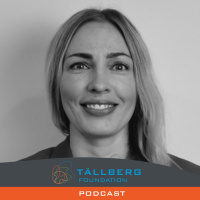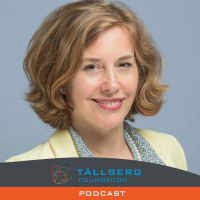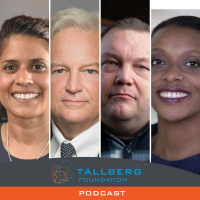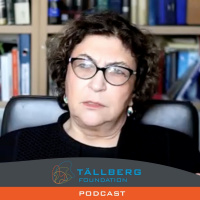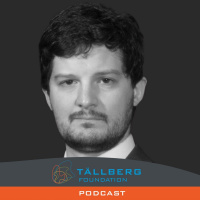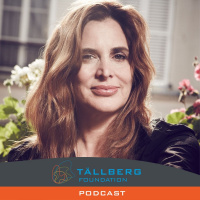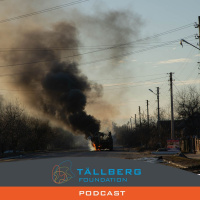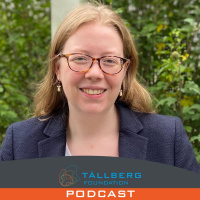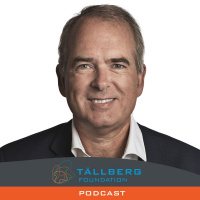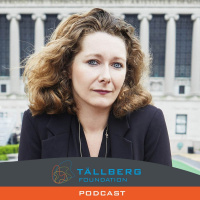Tallberg Foundation Podcast
- Autor: Vários
- Narrador: Vários
- Editora: Podcast
- Duração: 116:40:07
- Mais informações
Informações:
Sinopse
The Tällberg Foundation is an independent, non-partisan, non-profit educational organization with offices in Stockholm, Sweden and New York, U.S.A. For more than thirty years, the Foundation has encouraged a global conversation about issues that are critical to the evolution of our societies. We operate under an umbrella of intellectual freedom and through an open-ended learning approach that is unrestricted by special interests, political correctness or the boundaries of cultures and disciplines. In these podcasts you can hear conversations, interviews and reflections from our ongoing conversations around the world and online.
Episódios
-
Code Red: not for Earth, for Humanity?
23/06/2022 Duração: 36min“For the first time in human history, we face a planetary emergency.” Those words were written by Johan Rockström, Director of the Potsdam Institute for Climate Impact Research. Scientists tend to be sober, measured in their assessments and with a preference for others to draw the big picture conclusions. So, when an earth scientist as distinguished and accomplished as Rockström writes that “Human pressures on earth have reached dangerously high levels” which could imperil humanity’s survival, we should listen. Are you listening? If so, what do you think? And, more importantly, what are you going to do?
-
Worth Repeating - Them vs Us: What Ukraine Is Really About
09/06/2022 Duração: 35minAs Russia's war on Ukraine grinds on with no end in sight, what's at stake may be changing. As Blitzkrieg turned into a war of attrition, arguably the confrontation is becoming about something much bigger than European security arrangements. It's becoming about how the world works, about democracy versus autocracy, about free versus not free. A surprising list of countries, big and small, are either actively or passively supporting Putin's war. Why? Our guest has a theory; indeed, more than a theory, he has lived experience. Leopoldo López is a Venezuelan patriot, who has been imprisoned for his efforts to resurrect democracy in his country, and who, it's safe to say, is high on the list of people whom President Maduro wishes would just go away. Listen as Leopoldo explains how the fight to save Ukraine reflects a much bigger, existential fight for freedom everywhere.
-
Are You Listening?
02/06/2022 Duração: 44minOne of the ironies of the 21st century is that even though everyone on the planet seems to have a cell phone and to be actively connected to social media, too many people seem voiceless or, at least, don’t think their voices are heard. What’s going on? Who is voiceless, and why? Is the problem that too many are voiceless or that too many are not listening? Maybe unanswerable, but we asked some people to try. Listen to the conversation among Baiqu Gonkar, a Tibetan activist working at the intersection of technology, art and social good; Francis Hildebrand, a Colombian environmentalist working to sustain the Amazon; and Mike Niconchuk, an applied neuroscientist working with conflict-affected populations particularly in the Middle East. Diane Osgood, social impact strategist, moderated the discussion.
-
Don’t Fool with Mother Nature!
26/05/2022 Duração: 40minWe live in an era of accelerating, disruptive climate change. This isn’t about the random bad storm, but about systemic, dramatic shifts in climate. Change is everywhere, with catastrophic consequences that every credible forecast says will worsen. But how can we understand the reality of those changes? What’s likely to happen next, and what can we do about it? To look for answers we recently organized a conversation among Ugandan veterinarian Gladys Kalema-Zikusoka, Colombian Amazon expert and a friend of its indigenous people Francisco Hildebrand, and Finnish fisherman, scientist and village head man Tero Mustonen. All are deeply knowledgeable about the realities of their ecosystems, and even more deeply committed to finding solutions to the challenges thrown up by the changing climate. Our discussion was moderated by Maarten Koets.
-
Speaking Truth to Power in the Real World
19/05/2022 Duração: 35minAt a time when autocrats are rampaging and our democracies are weakening, the need for citizens to defend their rights has never been greater. But, does speaking truth to power matter in the real world? While we celebrate the bravery and eloquence of those who stand up to injustice and overweening authority, too often the bad guys seem to win. What would it take to change that outcome? The Tällberg Foundation recently hosted a conversation among three of the good “guys:” Kenyan poet Sitawa Namwalie, Bangladeshi photographer and activist Shahidul Alam, and American human rights lawyer Jared Genser. Their discussion was hosted in Vamvakou, Greece by the Vamvakou Revival and SNF (the Stavros Niarchos Foundation). Listen as they discuss the reality in the trenches of the fight for human rights.
-
Ukraine Changes Everything
16/05/2022 Duração: 38minRussia’s war on Ukraine changes everything. But the damage is not limited to Ukraine and to Russia. The knock-on effects include increased inflation and reduced growth around the world. Most importantly, the war seems to be the straw that is breaking the camel’s back of the post-Cold War world order, with unpredictable consequences. The Tällberg Foundation recently hosted a discussion that touched on many of these issues. The speakers were Alan Stoga, Tällberg’s chairman; Pierre Lellouche, former French minister and politician; Nikos Xydakis, Greek journalist and former minister; Tomas Anker Christensen, Danish diplomat, who spoke in his personal capacity. The conversation was hosted in Vamvakou, Greece by Vamvakou Revival and the Stavros Niarchos Foundation (SNF). This war is far from over and its reverberations will be with us for a long time.
-
Sweden Burning? Really?
05/05/2022 Duração: 36minWe live in the age of the refugee. Arguably, no country in the West has been more welcoming to refugees over the years than Sweden has. Progressive, secular, social democratic, Swedes have worked hard to integrate migrants into their society, to help refugees create new lives in their new home country. How then do you explain what happened last month during Easter when Stockholm, Malmö and other cities were racked by riots and violent clashes between police and mostly Muslim young men? Lars Åberg, one of his country's leading journalists and a prolific author, has thought and written about these questions for years. Listen as he explains what Sweden has done right, but also what it has done wrong.
-
Them vs Us: What Ukraine Is Really About
28/04/2022 Duração: 35minAs Russia's war on Ukraine grinds on with no end in sight, what's at stake may be changing. As Blitzkrieg turned into a war of attrition, arguably the confrontation is becoming about something much bigger than European security arrangements. It's becoming about how the world works, about democracy versus autocracy, about free versus not free. A surprising list of countries, big and small, are either actively or passively supporting Putin's war. Why? Our guest has a theory; indeed, more than a theory, he has lived experience. Leopoldo López is a Venezuelan patriot, who has been imprisoned for his efforts to resurrect democracy in his country, and who, it's safe to say, is high on the list of people whom President Maduro wishes would just go away. Listen as Leopoldo explains how the fight to save Ukraine reflects a much bigger, existential fight for freedom everywhere.
-
Poland to the Rescue
21/04/2022 Duração: 29minRussia’s war on Ukraine has set off the largest movement of refugees in Europe since the last World War. At least 2.7 million of these refugees have fled to Poland, a country with a spotty record—at best—when it comes to accepting migrants. But this time is different: even as the country builds a wall on its border with Belarus to keep out migrants from the Middle East, Poles and their government are welcoming the Ukrainians pouring across their border. Why the difference? Will there be limits to the hospitality? Marta Górczyńska, a Polish human rights lawyer, is hopeful. She has seen and dealt with her country’s efforts to close the border with Belarus as well as its enthusiastic opening of the border with Ukraine (at least for Ukrainians). Will the better angels prevail?
-
How Worried Are You?
14/04/2022 Duração: 34minOne of the many unintended consequences of the Russian invasion of Ukraine is the renewed discussion among politicians, as well as in the popular media, of nuclear war. How worried should we be about Russian or Korean or Chinese or prospectively Iranian nukes? Have we suddenly moved from a world of nonproliferation to a world of proliferation? Dr. Tytti Erästö is an expert on nuclear weapons at the Stockholm International Peace Research Institute (SIPRI). For her, a key assumption has long been that rational leaders would never use nuclear weapons. But now she is asking, what about irrational ones?
-
Does China Have Russia’s Back?
07/04/2022 Duração: 39minPerhaps the biggest known unknown in Russia’s invasion of Ukraine is China's role. What does that actually mean? How far will China go to keep Russian troops in the field? Promises aside, are there in fact limits? Tough questions that are very difficult, maybe impossible to answer, but our guest Alicia Garcia-Herrero recently offered some possibilities. Alicia is a senior fellow at the European think-tank BRUEGEL, as well as the chief economist for Asia Pacific at Natixis, a French investment bank.
-
Worth Repeating: Looking For—and Finding—Real Leaders
31/03/2022 Duração: 22minThe only hope for a world awash in troubles is that leaders with vision, universal values, and determination will seize the moment. But just bemoaning the lack of leaders accomplishes nothing. That’s why we established the Tällberg-SNF-Eliasson Global Leadership Prize. In 2021, our global jury selected two amazing leaders: Asha de Vos, a Sri Lankan marine biologist and Tero Mustonen, a Finnish climate scientist, fisherman and community leader. Listen as two jurors—David Kiernan and Marthe Reinette—discuss leadership, challenges and hope with the winners.
-
The Whole World is Watching!
24/03/2022 Duração: 38minThe whole world really is watching Russia’s brutal invasion of Ukraine. Except for audiences in Russia itself, that is. Among the many thousands of Russians reportedly fleeing their country are scores of Russia’s best journalists who have (understandably) given up the good fight. However, at least one has not: Yevgenia Albats. When the government stopped her from publishing and ended her radio show, she found ways to keep talking to her Russian audiences. At great personal peril, Yevgenia tells it like it is—to the Russians who depend on her and to us, who need her.
-
Is China Complicit in Ukraine?
17/03/2022 Duração: 28minArguably, any understanding of the Russian invasion of Ukraine must take into account the Beijing Winter Olympics or, rather, the meeting there of Presidents Xi and Putin. Can there be any doubt that they included Putin’s war plans as well as Xi's willingness to provide support when the much-advertised Western sanctions eventually kicked in? Why did Xi apparently green light Putin's war? What does China potentially gain from war in Europe? How does this war fit into China's long-term strategy? Listen as Jonathan Ward reflects on China’s role in Russia’s war and the implications for the United States and the rest of the West.
-
The Faces of War
10/03/2022 Duração: 34minThe world is transfixed by the tragic images emerging from Russia’s brutal invasion of Ukraine. Unfortunately, many modern conflicts never really end. Whether or not that will be the case in Ukraine remains to be seen. We too quickly move on to the next issue, assuming that what's done is done. War correspondents and war photographers know better. Our guest, Janine di Giovanni has spent much of her celebrated career so far reporting from the Balkans, Africa and the Middle East. She has witnessed the worst of what mankind can do to itself, but also the best that people under extraordinary circumstances can do for others. Listen as she discusses her experiences.
-
Special Edition: War in Europe
08/03/2022 Duração: 01h04minMost of us thought the war in the Balkans would be the last conflict in Europe. We were wrong. A revanchist Russia is trying to redraw borders, roll back history, and change Europe’s security reality. It’s impossible to predict how or when this ends. The Tällberg Foundation recently hosted a conversation about the conflict in Ukraine and its implications. This conversation featured Jan Eliasson, former Deputy Secretary-General of the United Nations, Pierre Lellouche, former French parliamentarian and minister, and Dalia Bankauskaitė, a strategic communications expert at Vilnius University in Lithuania, and was moderated by Alan Stoga, Tällberg’s chairman.
-
Talking about Talking
03/03/2022 Duração: 32minWars have cycles: sooner or later, the fighting ends and the negotiations begin. Of course how the fighting ends will shape whatever negotiations ensue. But it is never too early to think about the future contours of the map of Europe. This episode with Emma Ashford, Washington-based Atlantic Council geopolitical expert, was recorded before Russia attacked Ukraine. Nonetheless, Emma's thoughts and speculation about a new security structure for Europe are even more important now than when we discussed them before President Putin chose to go to war.
-
Welcome to the End of Democracy
24/02/2022 Duração: 32minJoel Kotkin, Executive Director of the Urban Reform Institute, recently published an essay on democracy’s demise. Donald Trump is not the villain of the piece. Rather, he argues that the withering of democratic process and institutions reflects the deeper transformation of our societies: the emergence of a ruling technocracy; the use of the pandemic and the environmental crisis to constrain individual rights; the growing distance between the governing and the governed. All of it made worse by the mind-boggling concentration of economic wealth.
-
What’s Next for the Climate: A Post Glasgow Perspective
17/02/2022 Duração: 35minClimate change is the ultimate example of a problem that can only meaningfully be addressed at the global level. Last November, more than 100 countries sent delegations to Glasgow for the 26th United Nations High Level Meeting on Climate. The results were mixed. Many new commitments were made, but not enough to meet the 1.5 degrees goal. And that was the easy part; delivering policies that actually bend the arc of global climate change is quite another. How likely is that? Is the UN process working? No one is better positioned to answer those questions than Denmark's Climate Ambassador Tomas Anker Christensen. Tomas was deeply engaged in the European and global run-up to Glasgow, in the negotiations in Scotland, and in the effort since then to translate words into action.
-
Saving Democracy, One New Leader at a Time
10/02/2022 Duração: 32minIn many, perhaps most countries in the West, there is a wide and growing gap between citizens and their political leaders. Governments often fail to deliver on basic aspects of the social contract and voters sometimes respond by endorsing extreme solutions on the right or the left. If there is a silver lining, it is that our sorry condition has caused some people to rethink how politics ought to work and try to reinvent, rather than tear down, democratic processes and institutions. Alice Barbe, a French political activist, do exactly that and recently shared her ideas, hopes and solutions.










